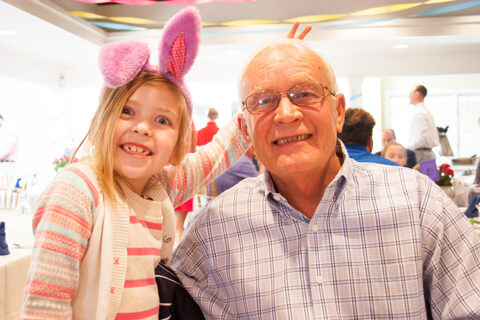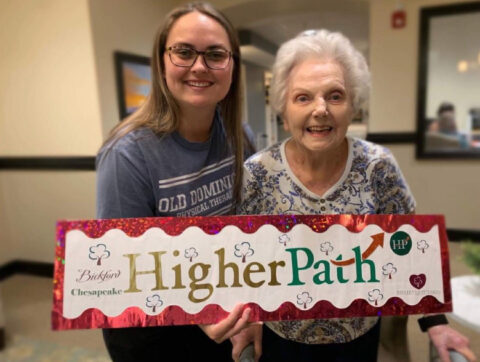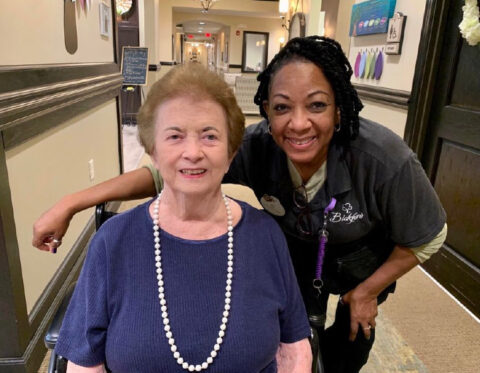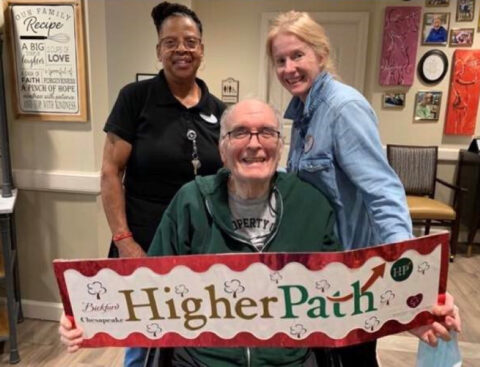A Transformation
When Ben Reese moved into Bickford of Chesterfield, Virginia, in the throes of a battle with cancer and an associated neurological syndrome, it seemed likely he didn’t have much time left.
“When they wheeled him in the front doors, he was on a stretcher and I thought to myself, ‘Oh my goodness, we don’t have long at all,’” recalls Eileen Kwak, Executive Director at Chesterfield. “His son and daughter walked in looking so sad, and I thought, ‘This is going to be a hard one.’”
She wasn’t entirely wrong. Yet before Ben’s life was over, he would amaze the Bickford staff, his family and even himself with his incredible will and ability to regain the independence that seemed lost for good.
Just a few months before his arrival at Bickford, Ben had been a healthy and active 74-year-old grandfather of two. He loved to golf, kept his family laughing and made friends wherever he went.
“He was fun,” says Ben’s daughter, Christy Bryant. “He was one of those people that got along with others very well. He was always just awesome to me and my brother.”

In the summer of 2022, Ben started experiencing some strange symptoms: blurry vision, extreme anxiety, difficulty walking. Christy took him to the hospital in September, where his condition quickly deteriorated. After two weeks of tests, doctors finally discovered that Ben had small cell lung cancer. The symptoms that had brought him to the hospital were likely the result of paraneoplastic syndrome—a rare condition in which Ben’s immune system, in fighting the cancer, was also attacking the healthy cells of his nervous system.
The only way to treat the syndrome was to treat the cancer, which they did with chemotherapy and radiation. By the time Ben arrived at Bickford, two months after he was first admitted to the hospital, he couldn’t talk, feed himself, use the bathroom, or even sit up in a wheelchair. He was so ill that he needed an ambulance transport from Bickford to get to his final two radiation treatments.
“Then he was done, and we just had to wait and see what was going to happen,” Christy remembers. “He couldn’t do anything for himself.”
At Bickford, Ben moved into memory care, where the best staffing ratios would give him the high-level attention he needed. From the start, Ben’s family made it clear they were not giving up. “They were adamant that they didn’t want to start hospice,” Eileen says. “They were so committed to him.”
Ben started physical, occupational and speech therapy, where initially the goal was simply for him to lose as little conditioning as possible while he was so sick. Christy visited his bedside daily to help keep his body moving, and Ben became a regular feature of the branch’s weekly Higher Path meetings, where the Bickford team would monitor his progress and setbacks.
“Slowly he started to come back,” Christy recalls. About a month after he moved into Bickford, Ben was able to start sitting up in a chair. The next month, he regained his ability to talk. “Once he started talking, he never stopped,” Eileen remembers. “He was always on his cell phone. He called his daughter about 100 times a day.”
By early spring, Ben had started feeding himself and transferring to the toilet with help. “He was just determined that he was going to gain his independence back,” Eileen says. “He did not waver and he expected that from all of us. I’ve never seen anybody be so disciplined and determined that they were going to improve themselves.”


In March he really turned a corner, getting himself to the bathroom alone and taking showers with the assistance of therapists. In just a few months, Ben had done what seemed impossible at the outset: He gained enough independence to leave memory care and move into assisted living.
“He had been literally like a vegetable, and it was hard to believe he was not going to be a vegetable anymore,” Christy says. “I was delighted. I thought the sky’s the limit at that point.”
In assisted living, the therapy team devised safety precautions so Ben could shower by himself. Determined to walk, Ben set his sights on reaching the end of the hallway, then making a loop of the building, then getting outside. At first staff would stand by his side or trail behind him with a wheelchair, but eventually he could make his own way to his beloved breakfast of bacon and eggs every morning at 8 a.m. sharp. Ben’s first outing from Bickford was for Easter at Christy’s house, and later in the spring his golf buddies picked him up for a day on the course.
“He just continued to set these small goals for himself and hit them,” Eileen says. “I don’t know if he necessarily realized how amazing they all were, no matter how big or small.”
Ben continued his steady progress until his sudden passing in September, from cardiac arrest following a short bout of pneumonia. His smile is dearly missed at the Bickford branch he called home for nearly a year, where he is remembered for his unlikely and amazing journey to independence.
“His absence is felt,” Eileen says. “He really is a miracle story.”
The magnitude of Ben’s progress wasn’t lost on him. Christy remembers her father becoming emotional when he reflected on his own advances. “He would say, ‘When I came here I couldn’t even sit up, and now look what I can do,’” Christy recalls tearfully. “He was so thankful. He was proud of himself.”.
Contemplating the next chapter in your loved one’s story? Click here to learn more about Bickford Senior Living and to find a branch near you.



